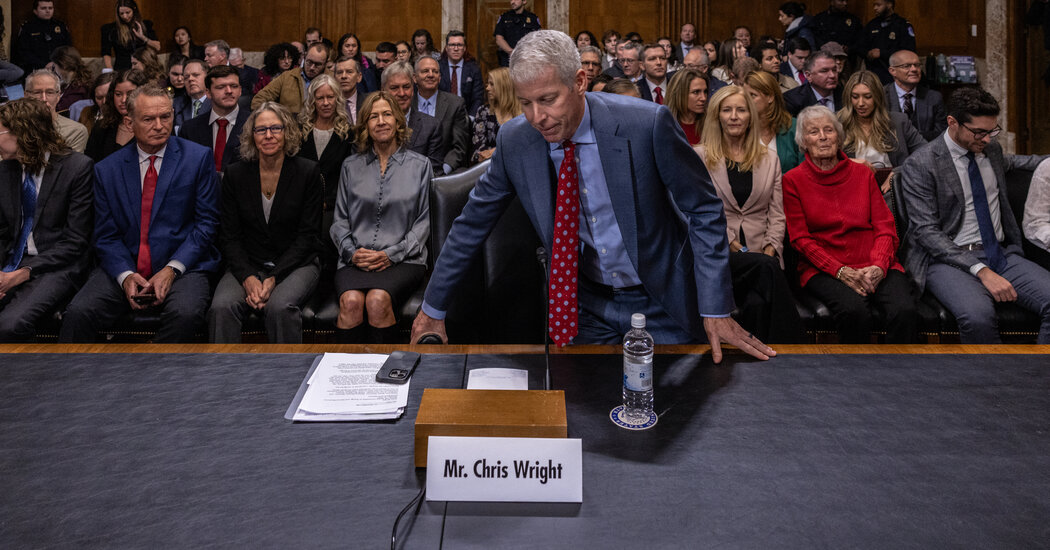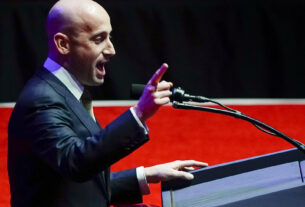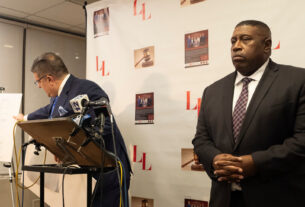Once Pam Bondi is confirmed as attorney general, she will be free to handle matters involving some of her former lobbying clients, thanks to an agreement she signed with federal government officials.
That agreement will not prove to be unusual in the second Trump administration.
Chris Wright, after his expected confirmation as energy secretary, will oversee federal policy as it relates to oil and gas companies nationwide, even as he expects to receive a million-dollar bonus from the Colorado-based oil-industry service company he currently runs.
Robert F. Kennedy Jr., if confirmed as health secretary, intends to allow a member of his family to accept a cut of the proceeds in a group of lawsuits pending against one of the world’s largest pharmaceutical companies, even as he will have oversight of the Food and Drug Administration.
Those are just a few details included in publicly released letters that lay out negotiated agreements between the members of the new administration and federal ethics officials.
These letters, and associated financial disclosures, illustrate the extraordinary wealth of Mr. Trump’s cabinet picks, as well as the uncharacteristically large list of potential conflicts of interest with which they enter the government.
Each signed letter is supposed to detail what decisions these officials can be involved in, and which they must stay away from, to avoid violating federal conflict of interest rules.
For example, Ms. Bondi, the former Florida attorney general turned lobbyist, agreed that for one year after her confirmation as U.S. attorney general she will refrain from doing business on “any particular matter” that involve parties represented by Ballard Partners, her former firm. She also agreed not to do business with any clients she personally represented for one year from when she last dealt with them.
That there are so many redlines being identified — and other situations where nominees are being given clearance to remain involved in matters despite outstanding family or past financial ties — is perhaps not surprising. Mr. Trump’s cabinet nominees have combined assets worth at least $1.5 billion, according to counts by The New York Times.
A total of 467 separate conflicts that require recusal, meaning at least temporarily the official cannot handle certain matters, have been identified in 15 of these ethics letters filed so far by senior Trump administration officials or those pending confirmation, according to a tally by Campaign Legal Center.
The largest number of these recusal requirements will be imposed on Howard Lutnick, a Wall Street financier and the nominee for Commerce Department secretary, who at least initially must refrain from being involved in certain matters involving 106 different corporate entities.
To outside ethics lawyers, this is a minefield of potential problems, and reason to be apprehensive, given that during Mr. Trump’s first term, several of his cabinet members failed to honor ethics promises they made to avoid actions that benefited their families or financial interests.
The White House press office did not respond to a request for comment.
President Trump, as well, has already made clear that he sees nothing wrong with taking official government acts that could benefit his family’s finances, such as appointing a crypto-friendly lawyer to oversee the Securities and Exchange Commission, just as his sons helped start two different cryptocurrency businesses.
The concern escalated late last week when Mr. Trump moved to fire — perhaps illegally — more than a dozen inspector generals at federal agencies, offices that in the past have investigated allegations of wrongdoing by top political appointees, including several of Mr. Trump’s cabinet members when he was serving his first term.
Mr. Trump, at least so far, has not adopted his own formal ethics guidelines, a step every president since President Obama has taken to supplement criminal and civil conflict of interest laws for top political appointees to attempt to prevent even the appearance of a conflict of interest.
These memos typically include “revolving door” bans that limit the hiring of federal officials who had just left jobs as lobbyists, so they are not overseeing industries they had recently tried to influence. The concern continues, in some cases, even after Mr. Trump’s nominees sell ownership stakes in various businesses, as they might still have relationships or perhaps outstanding but more narrow financial ties with their former companies or clients.
“The array of potential conflicts is huge,” said Kedric Payne, general counsel at Campaign Legal Center, a nonprofit watchdog group, which shared a copy of its database of all the ethics letters and commitments that the incoming cabinet members have made. “And there is no certainty there will be enforcement. Ethics is not an issue you need to focus on. That is the message so far from the top.”
Several requirements of the appointees are designed to reduce conflicts of interest and enhance transparency.
First and foremost, federal criminal law prohibits executive branch employees —with the exception of the president and vice president — from taking any action that financially benefits themselves or family members.
Federal law also requires top federal officials, including all the incoming cabinet members, to submit a financial disclosure report that details the money they made in the prior year or two, the value of all their assets and any stocks or other investments they own.
In addition, every federal agency has a designated agency ethics officer who reviews those filings and then helps the incoming federal employee draft the ethics letter that explains which of these assets the new official must sell off upon confirmation to avoid any conflict and what other steps will be taken to avoid ethics violations.
For example, Mr. Lutnick, who is awaiting confirmation to serve as the new commerce secretary, promised in a 28-page ethics letter he signed on Jan. 21 that for at least one year after he takes office he will “not participate personally and substantially in any particular matter” that involves BGC Group, Newmark Group or Cantor Fitzgerald, all financial firms that he has helped run for years and is selling his interests in.
Mr. Lutnick also agreed to take any bonus payments he was owed by these companies before Jan. 23 — so he no longer would be paid directly by them while in office. As a result, the ethics letter implies, once he has finished selling off his ownership stake, he will still be able to participate in decisions he knows might have “a direct and predictable effect on the financial interests” of his former companies — as long as executives there are not directly involved in pushing for these policies.
The challenge is that Mr. Lutnick’s financial disclosures show holdings in more than 800 separate corporate entities collectively worth nearly $1 billion, often with obscure names like “CF WG Net Lease Mezz LLC.” That makes it all but impossible for outsiders to police his ethics promises, as the specific nature of these corporate entities, the full list of officers and the investments they are involved in are not often public.
Mr. Lutnick said he will eliminate any of these conflicts with the sale of these holdings.
“I’ve made enough money in my life,” he said at his confirmation hearing this month. “I can take care of myself, I can take care of my family. It is now my chance to serve the American people.”
He still will have ties to at least some of his former firms: Cantor Fitzgerald in December announced that his son, Brandon Lutnick, 27, had been appointed the new chief executive of one of its related entities, Cantor Equity Partners.
Mr. Wright, who for nearly 15 years has run an oil and gas fracking company called Liberty Energy that is now publicly traded and has a $3.1 billion market capitalization, is slated — as detailed in his ethics agreement — to get paid his last bonus from the company in March, presumably even after he is running the Energy Department.
He also has promised to not participate personally and substantially in any matter that directly affects Liberty Energy, at least as it relates to “ability or willingness of Liberty Energy” to pay him this bonus, the ethics agreement he signed on Jan. 14 says.
Mr. Wright was also asked at his confirmation hearing if he was “aware of any personal holdings, investments or interests that could constitute a conflict.” His answer was “I am not.”
Senator Ron Wyden, Democrat of Oregon, who until last month was chairman of the Senate Finance Committee, separately questioned Scott Bessent, the financier slated to take over the Treasury Department, during his confirmation hearing if he supports extending the tax cuts Mr. Trump secured during his first term.
The tax cuts broadly benefited wealthy Americans and financial firms, including Mr. Bessent’s hedge fund, known as Key Square Group, as most such funds benefit through a pass-through income provision that lowers federal taxes.
Supporting the extension of the tax cuts would not likely bring a particular interest to his former firm, so there is no limit in his ethics letter on his playing such a role, and Mr. Bessent said he intended to do so.
“This is the single most important economic issue of the day,” Mr. Bessent told senators during the hearing this month. “This is pass/fail. If we do not fix these tax cuts, if we do not renew and extend, then we will be facing an economic calamity.”
Mr. Trump’s appointees, in his first term, were frequently cited by outside ethics lawyers and in some cases even government investigators, for violating promises to act ethically.
Elaine Chao, who served as Mr. Trump’s transportation secretary, was criticized by the department’s inspector general after articles were published in The Times, for repeatedly using her office staff to help family members who ran a shipping business affiliated with China.
And Ryan Zinke, who was interior secretary, continued to negotiate with developers about a real estate project in his Montana hometown that he had an interest in, even after he signed an ethics agreement vowing not to participate in such matters. Mr. Zinke, who more recently was elected as a U.S. representative from Montana, also then lied about his role in the matter, the inspector general concluded.
Richard Painter, who served as a White House ethics lawyer during President George W. Bush’s tenure and has written a book on federal ethics policies, said that he expects that the second term of Mr. Trump will feature even less compliance with ethics rules.
“The tone of this administration is going to be a lot more confrontational to the norms of government than even the first Trump administration,” he said, pointing to the recent firing of the inspectors general and the lack of an ethics memo, like every president since Mr. Obama has issued. “It is discouraging. Very discouraging.”
Kate Kelly contributed reporting.





